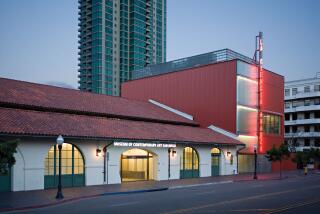Historical Society Seeks Place to Display Wares
- Share via
Bill Harris has trouble finding things these days.
He has maps and letters stuffed into cardboard boxes piled high against the walls of his office at the senior center. Photographs line the spaces between the file cabinets there. And his garage at home is chock full of old trophies, paintings and magazines.
The stuff has “squeezed my car clear out. I park in the street now,” said Harris, president of the Historical Society of Long Beach.
All for the sake of history.
But the 76-year-old retired insurance salesman does not understand why a city the size of Long Beach should have its entire historical heritage packed in boxes. In fact, he says, it is a crime against the future.
Offerings Rejected
“They’re tearing down so many buildings,” he said of this city whose face is changing more rapidly than at any other time in its 100-year history. Keeping records “is the only way for our heirs to know about the roots of Long Beach,” he said.
So Harris is raising money for a museum. With adequate space, he said, the society could begin accepting some of the contributions of historical artifacts and documents it routinely rejects. And, by cataloguing and displaying its vast existing collection, he said, the historical society--which supplies information to researchers and the press and has representatives appear before civic groups, clubs and churches--could better serve Long Beach as a valuable resource.
“Every little town from here to Eureka has an historical museum,” said Harris, who has asked the city to help him find a suitable site for the project. “Why not us?”
In fact, finding a permanent home for the historical society has been Harris’ dream since 1983, when the organization moved to its present city-owned quarters, a cramped, 700-square-foot suite at the Long Beach Senior Center on 4th Street.
Founded in 1962 by the Kiwanis Club as a private, nonprofit entity dedicated to collecting and preserving the history of Long Beach, the group operated for its first five years out of people’s homes. Since then, said Harris, membership has grown from 25 to about 350.
In 1969, the organization--already in possession of a growing collection of historical documents, photographs and artifacts--moved to a small cottage at Rancho Los Alamitos, a Spanish rancho once occupied by the original owners of the land on which Long Beach stands. A decade later, when deterioration forced abandonment of the cottage, the group moved to the historical Rancho Los Cerritos, where it stayed for five years before settling at the senior center, where it is open 15 hours a week.
Although the society’s collection has grown dramatically since the early days, its present home has about 300 square feet less space than the Rancho Los Alamitos site. As a result, Harris said, what can’t be packed into boxes or stored in his garage is kept in the basement of the senior center or at members’ homes.
Included are more than 25,000 historical photographs and thousands of newspaper clippings, as well as tons of books, maps, letters, documents, scrapbooks, brochures, plaques and trophies. A permanent facility of at least 2,000 square feet is required to adequately store and display the material, Harris said. With an eye toward obtaining such a facility, he started a trust fund several years ago that now has about $62,000.
But raising money has not been easy. The society’s income amounts to about $6,000 a year, mostly from the publishing and sale of booklets and photographs. Annual dues are $15 for individuals and $25 for families. Of that, Harris said, the society--which relies on volunteer labor--pays rent to the city.
“We are a big service to Long Beach,” Harris said. “People call City Hall and City Hall sends them to us.”
Which is why he would like the city to help the society find a place to relocate, either for purchase or to rent. Mayor Ernie Kell, one of the society’s best-known members, thinks that is not an unreasonable request.
“It’s very definitely an important asset,” he said of the society and its collection. “I think they do an outstanding job. Hopefully, I’ll be working with Mr. Harris so that we can start looking around for a more suitable” location.
In the meantime, Harris said, it is business as usual at the Long Beach Historical Society. “People come in and ask us for things we know we have,” he said, “but we can’t find them.”
More to Read
Sign up for Essential California
The most important California stories and recommendations in your inbox every morning.
You may occasionally receive promotional content from the Los Angeles Times.













